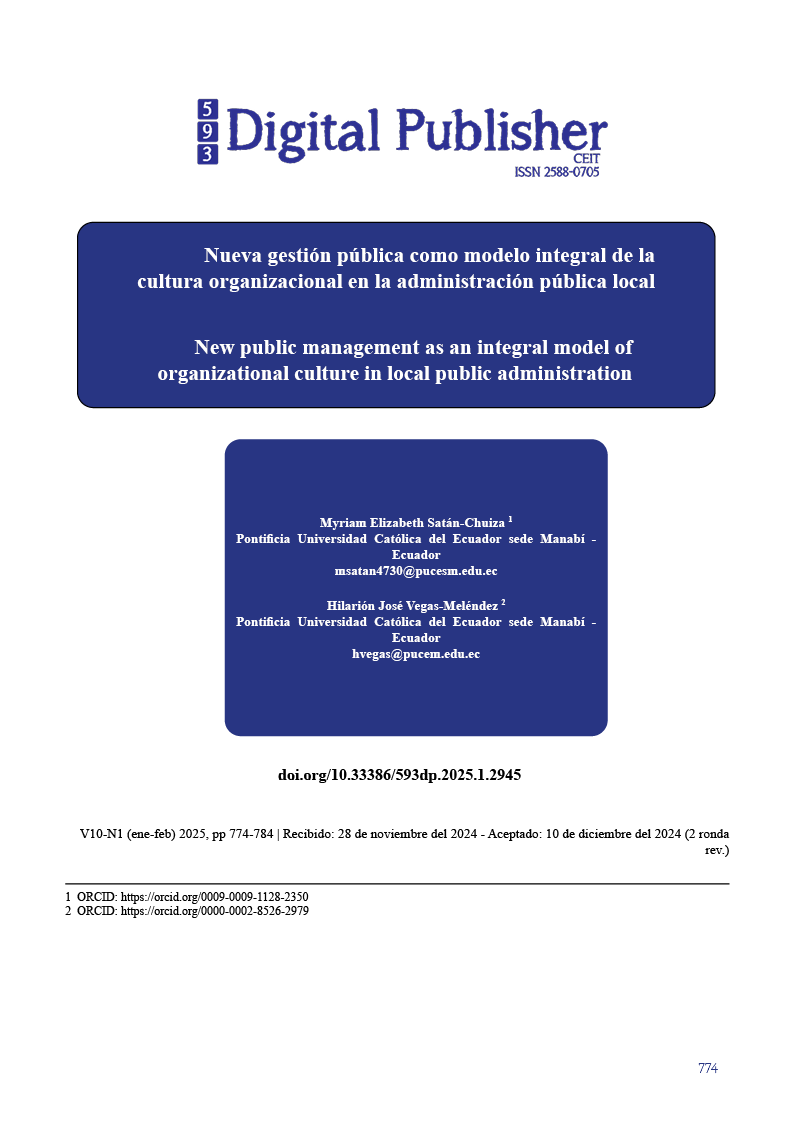New public management as an integral model of organizational culture in local public administration
Main Article Content
Abstract
The main objective of the research consisted of interpreting the components of the New Public Management that make it possible to improve the organizational culture in the local public administration; having as specific objectives: to contextualize the model of the New Public Management in the local public administration; and, to reflect on the proposal of the New Public Management as an integral model of the organizational culture. The methodology applied is of qualitative approach and inductive method, in addition to the instrumentation of an interpretative-hermeneutic method, with a design, as well as a documentary review strategy. The data collection instrument has been direct observation and bibliographic consultation, incorporating a qualitative content analysis as a data analysis technique, as well as the triangulation between the narrative of the concepts found. In addition to linking the theories that support the themes proposed in the research, added to the researchers' own criteria. Three findings emerge from the triangulation that give the following aspects: 1.- More decentralized public policies, 2.- Managerial instruments for public management, and 3.- Transparency and Accountability. Among the main conclusions is the fact that the NPM is not fully consolidated in a region such as Latin America, due to its high managerial content, although its postulates are announced in a number of countries.
Key words: public administration, organizational culture, new public management
Downloads
Article Details

This work is licensed under a Creative Commons Attribution-NonCommercial-ShareAlike 4.0 International License.
1. Derechos de autor
Las obras que se publican en 593 Digital Publisher CEIT están sujetas a los siguientes términos:
1.1. 593 Digital Publisher CEIT, conserva los derechos patrimoniales (copyright) de las obras publicadas, favorece y permite la reutilización de las mismas bajo la licencia Licencia Creative Commons 4.0 de Reconocimiento-NoComercial-CompartirIgual 4.0, por lo cual se pueden copiar, usar, difundir, transmitir y exponer públicamente, siempre que:
1.1.a. Se cite la autoría y fuente original de su publicación (revista, editorial, URL).
1.1.b. No se usen para fines comerciales u onerosos.
1.1.c. Se mencione la existencia y especificaciones de esta licencia de uso.
References
Barzelay, M. (2000). The New Public Management. Improving Research and Policy Dialogue, Berkeley. https://www.academia.edu/1642570/The_new_public_management_Improving_research_and_policy_dialogue
Castillo-Rocuber, N. (2019). Acerca de los Paradigmas de la investigación educativa. https://www.ecured.cu/Investigaci%C3%B3n_educativa#Definici.C3.B3n_de_paradigma
Centro Latinoamericano de Administración para el Desarrollo CLAD (2007). Una Nueva Gestión Pública para América Latina. Documentos del CLAD. https://clad.org/wp-content/uploads/2020/07/Una-Nueva-Gestion-Publica-para-America-Latina.pdf
Código Orgánico de Organización Territorial, Autonomía y Descentralización de Ecuador COOTAD (2010). Registro Oficial Suplemento 303 de 19-oct-2010. Estado: Vigente En línea: https://www.oas.org/juridico/pdfs/mesicic4_ecu_org.pdf
Denzin, N. K., y Lincoln, Y. S. (1998). The landscape of qualitative research. New Delhi: Sage Publications.
Heredia-Calderón, L., & Vegas-Meléndez, H. . (2023). Estrategias de la gobernanza institucional. Una oportunidad para la transparencia en empresas públicas: Unidad de estudio: E.P. Corporación Nacional de Electricidad (CNEL), Provincia de Manabí. 593 Digital Publisher CEIT, 8(3-1), 160-176. https://doi.org/10.33386/593dp.2023.3-1.1859
Husserl, E. (2004). Ideas relativas a una fenomenología pura y a una filosofía fenomenológica. Madrid: Fondo de Cultura Económica de España.
Martínez, M. (2009). La nueva ciencia. Editorial Trillas. ISSN-e 1316-5216, Nº. 46, 2009, págs. 11-32. https://dialnet.unirioja.es/servlet/autor?codigo=1959221
Osborne, David y Gaebler, Ted (1994). La Reinvención del Gobierno. La influencia del espíritu empresarial en el sector público. Editorial Paidos. https://revista.cortesgenerales.es/rcg/article/view/1048
Ramio C. (2017). De la Administración pública del pasado a la Administración pública del futuro. https://www.gigapp.org/index.php/comunidad-gigapp/publication/show/2050
Schwandt, T. R. (2000). Three epistemological stances for cualitative inquiry, en Sandín-Esteban, Ma. Paz, 2003, Investigación cualitativa en educación. Fundamentos y tradiciones. McGraw-Hill/Interamericana de España, p. 123.
Vegas-Meléndez, H. (2016). La teoría fundamentada como herramienta metodológica para el estudio de la gestión pública local. Revista Venezolana de Gerencia, 21 (75), 413-426.
Vegas, H. (2017). Políticas públicas y gobernanza Articulación para una gestión pública local autónoma. Obtenido de https://www.scielo.cl/scielo.php?script=sci_arttext&pid=S0718-65682017000300155#B14



